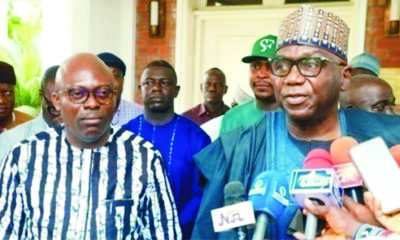City Crime
Italy’s PM To Resign Over Financial Crisis
Italian Prime Minister Silvio Berlusconi said he would resign after the country’s budget is passed. The 75-year old Berlusconi has been a dominant force since forming the Forza Italia party in 1994, and his pending departure marks the end of an era for Italian politics.
But while the political spectacle that came with Berlusconi could now fade, the financial show might be just beginning. The pricing – set by traders who are selling Italy’s bonds – hit 7.3% by mid morning after breaking through 7% a short while earlier. “It’s like tectonic plates,” a desk analyst told CNN. “You have this pressure and then it breaks.”
To put Italy’s bond yields in context: Ireland bond yields were just over 8% before the country was bailed, Greek yields touched 10% and Portugal’s hit 9%.
Italy and Spain – the eurozone’s third and fourth largest economies – are those often referred to as too big to fail. So far, the eurozone countries and the European Central Bank have actively kept the bloc’s struggling economies afloat.
But their powers may be limited when it comes to Italy. The numbers are huge, and the political – and financial – capacity to continue supporting the bloc’s weak will face a mighty test should Italy stumble.
The numbers are brutal. Italy’s economy makes up 17% of the eurozone. Combined, Greece, Ireland and Portugal – the countries currently living off Europe’s bailout fund and the International Monetary Fund – make up less than 6%.
Italy’s debt stands at €1.9 trillion ($2.6 trillion), or 120% of gross domestic product. Compare that to the combined Greece, Ireland and Portugal’s debt – around €640 billion as at full year 2010, according to Eurostat, the statistical office of the European Union.
Italy faces around €380 billion in bond repayments and deficit costs by the end of 2012, according to Evolution Securities’ analyst Elizabeth Afseth. Its next major payment is €26 billion, due in February next year. With its funding costs now over 7%, that could prove an huge hurdle.
The oft-quoted 7% figure is, by and large, arbitrary. It is regarded as the level at which countries can no longer fund themselves – but depends on how long it stays at that level and how much the country needs to raise.
Vitally, however, it is a measurement of confidence and that – in these volatile markets – matters. When yields hit 7% it is extremely difficult to pull them back. According to Afseth, it is seen by investors as a “point of no return.”
And Italy’s situation is probably worse than the bond yields suggest, with the ECB’s intervention keeping the price of its funding down. According to Evolution Securities, the ECB began buying Italian and Spanish bonds on August 8 this year, after yields hit 6.08%. The following week, the ECB settled €22 billion of purchases. Last week, the bank settled €9.52 billion in purchases – the bulk of which were most likely Italian bonds, according to Afseth.
While the ECB – whose presidency has just been taken up by Italy’s Mario Draghi – has proved a key player in the survival of the eurozone to date, its patience appears to be growing thin. This week Yves Mersch, the governor of Luxembourg’s central bank and a member of the ECB’s governing council, told Italy’s La Stampa the bond buys should be “limited in quantity and in time.”
He said if the bank’s interventions are being undermined by a lack of effort from national governments, “we should ask ourselves about the problem of incentives.”
If Italy is forced to turn to Europe’s bailout fund, the outcome looks ugly. The fund is being enlarged to a lending capacity of €440 billion. Of that, around €140 billion has been committed to the bailouts of Greece, Ireland and Portugal, according to Afseth.
That leaves €300 billion – a sum that Italy would suck up, before needing more.
Plans to leverage the bailout fund, part of the triple-pronged attack on the crisis revealed after European leaders’ crisis meeting in October, will also suffer from the market’s plummeting confidence.
And so the markets watch and wait, as Italy’s “too big to fail” economy teeters on its financial tightrope.
City Crime
Delta Attorney-General Laments Hike In Human Trafficking

Delta State Attorney-General and Commissioner for Justice, Ekemejero Ohwovoriole (SAN) has lamented the increasing rate of human trafficking, especially the girl child in the state.
Ohwovoriole decried the increase in his office in Asaba when the zonal commander of the National Agency for the Prohibition of Trafficking in Persons (NAPTIP), Mr Nduka Nwawenne paid him a courtesy visit.
The Attorney-General stated that it was against the dignity of the state and disheartening to see that Delta State now ranked first in human trafficking, overtaking Edo State.
He stressed the need for stakeholders to tackle the menace, adding that if it was one single victim that was rescued, they would be rewarded for their efforts.
Ohwovoriole stated that young girls were the most vulnerable ones in the issue of human trafficking, stressing that children from poor family backgrounds also fall victim to human trafficking.
While saying that their request for an office space in the state would be looked into, to see how the government could be of assistance to them, he assured them of his ministry’s partnership in the fight against human trafficking.
He said that the Task Force on human trafficking and irregular migration, which he chairs, should be having regular meetings.
Earlier, the Zonal Commander of Naptip, Mr. Nwawenne informed the commissioner that Delta state had overtaken Edo state as the foremost state in human trafficking in nigeria.
He told the Attorney-General that their Zonal Command was the first to be established in Nigeria because of the prevailing issues of human trafficking in the area, noting that ika south was the highest in cases of human trafficking as a result of its proximity with edo state.
Nwawenne appealed to the Commissioner and the State Government to provide office accommodation for their officials to operate in Asaba.
City Crime
Army Arrests 50 Foreigners, Others For Job Racketeering

The Nigerian Army said it has arrested 50 suspects, including foreigners, for alleged international job racketeering in Lagos.
The Director, Army Public Relations, Brig. Gen. Onyema Nwachukwu, who addressed journalists in Abuja, on Wednesday, said the suspects were arrested during an operation jointly conducted by the Army and the Nigeria Immigration Service.
He also disclosed that no fewer than 13 criminals were killed and 88 arrested during various operations across 20 states of the federation.
Among those arrested include 50 suspects comprising foreigners who were nabbed for alleged International job racketeering.
Onyema said, “In the South-West region, on November 2, 2023, troops of 9 Brigade Nigerian Army in conjunction with personnel of Nigerian Immigration Service, Lagos State Command, conducted a raid operation on a suspected criminal hideout at Ifako Ijaye.
“During the operation, 50 suspects, including foreigners who specialise in international job racketeering, were arrested. In a similar development same day, the same troops arrested two suspects at a hotel in Ogba in the Ikeja LGA.
“The arrest was in connection with the murder of one Mallam Idris Ardo, the Ardo of Panya Village in Plateau State. Preliminary investigation revealed that one of the arrested suspects masterminded the killing of Ardo and fled the community since the incident occurred.”
City Crime
Elder Statesman Charges FG On Judges, Magistrates’ Security
An elders statesman and advocate of oil rights in the Niger Delta, Rev Sokari Soberekon, has called on the Federal Government to beef up security for High Court Judges and Magistrates in the country. The iconoclastic doctor of humanities made this plea while addressing newsmen during the just concluded 2023/2024 rededication of the legal year of the Rivers State Judiciary held at the St. Cyprian’s Anglican Church in Port Harcourt last Thursday.
Soberekon stressed the essence of maximised security for Judges and Magistrates in Nigeria to ensure prompt and fearless dispensation of justice, equity and fairplay. He, maintained that apart from armed Police orderlies, the Judges and Magistrates should be legally authorised to keep personal arms for self defence when necessary, adding that this innovative policy would enhance the desired environment for an independent judiciary.
According to the octogenarian minority rights activist, the judiciary is the sanctuary of justice and equity.
He recalled the circumstances surrounding the gruesome murder of the former Federal Attorney General and Minister of Justice, Late. Chief Bola Ige.
Soberekon noted that, in spite of the retinue of official security aides attached to the late former Governor of Oyo State, Ige would not have been murdered if he was personally armed on that fateful day of his demise.
Soberekon emphasised the need to shun eye service in the nation’s polity.
He, however, maintained that the only Oga in politics is God Almighty, who he said uses people to install others in office.
Soberekon recalled the meeting he had with King Alfred Diete-Spiff in Lagos from where the pioneer Governor of the State started planning the blueprint of the old Rivers State.
He said what Rivers State needs now is peace, and applauded the placard with the description, ‘Peace’, displayed during the rededication ceremony.
He noted with delight that while delivering a sermon at the occasion, the Vicar of the church advised Nigerians to give peace a chance and also to build a nation where peace and justice reign.
-

 Niger Delta3 days ago
Niger Delta3 days agoRSG Seals Two Hospitals In Bonny …Set To Inaugurate Anti-Quackery Committee
-
Entertainment3 days ago
Davido Narrates How His Song Became President’s Ringtone
-

 News11 hours ago
News11 hours agoSpeak Truth To Power, Prof Omotola Tells Journalists
-

 Politics10 hours ago
Politics10 hours agoBayelsa Repositioning Local Councils For Service Delivery – D’Gov
-

 News4 days ago
News4 days agoN5.2trn Debt: FG Recovers N57bn From 10 MDAs
-

 Editorial3 days ago
Editorial3 days agoThat Odili’s Health Centre Gesture
-

 Nation14 hours ago
Nation14 hours agoWIW: Banigo Advocates Legislative Impetus
-

 News11 hours ago
News11 hours agoLet’s Fight To Save Rivers’ Soul Together

